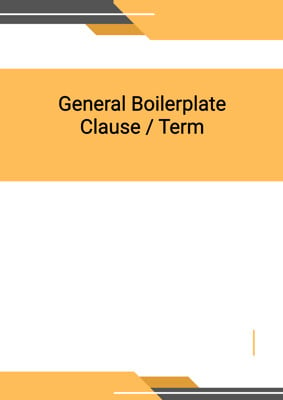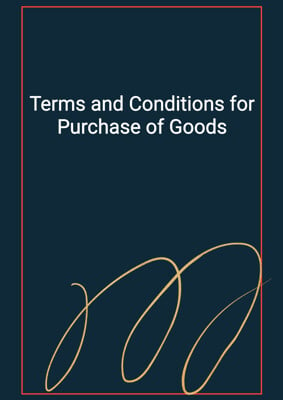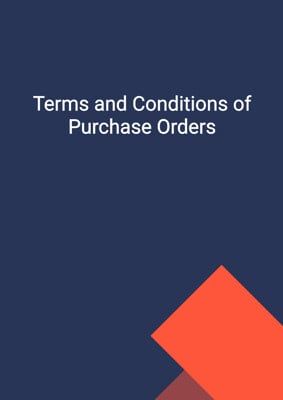
Terms and Conditions for Purchase of Goods
Conditions of Purchase Order
This document can be used to draft standard terms and conditions for the purchase order of goods between a Purchasing Company and the Seller. This document is drafted in favour of the Buyer and the parties are deemed to have accepted them by transacting without signing.
How to Tailor the Document for Your Need?
01
Create Document
Click "Create Document" button and the document will be prepared with your account details automatically filled in.
02
Fill Information
Please fill in any additional information by following the step-by-step guide on the left hand side of the preview document and click the "Next" button.
03
Get Document
When you are done, click the "Get Document" button and you can download the document in Word or PDF format.
04
Review Document
Please review the document carefully and make any final modifications to ensure that the details are correct before publication / distribution.
Document Preview
Document Description
The document titled 'Terms and Conditions for Purchase of Goods' is a crucial document that outlines the terms and conditions that govern the purchase of goods by a company. It is important as it establishes the rights and responsibilities of both the company and the supplier, ensuring a clear understanding of the expectations and obligations.
The entire document consists of twenty sections, each addressing a specific aspect of the purchase process. The first section emphasizes the requirement for orders to be issued on the company's printed order forms, duly signed on behalf of the company. This ensures that the company will not be liable for any orders that do not comply with this condition.
The second section highlights the importance of accepting the order within a specified time frame. If the order is not accepted within the stipulated time, it can only be considered valid with the express written confirmation from the company. Any alterations or extensions to the order must also be confirmed in writing.
The third section focuses on the delivery of goods and the completion of work as per the company's instructions. It emphasizes the need for timely completion and adherence to the requirements and standards specified in the order. Failure to comply may result in the company canceling the order and purchasing the goods from another source, holding the supplier responsible for any additional expenses incurred.
The fourth section emphasizes the importance of providing an advice note and a delivery note along with each delivery. These notes should clearly state the order number and failure to provide them may cause delays in payment of invoices.
The fifth section highlights the requirement for timely invoicing, stating that invoices must be rendered immediately upon dispatch of the goods. Invoices must reach the company by a specified date to ensure prompt payment. Failure to comply may result in the invoices being carried forward to the following month's account.
The sixth section focuses on the statement of account, which must be rendered by a specific date following delivery. Prompt payment may allow for alternative arrangements, but failure to comply will result in delayed payment without forfeiture of any discount.
The seventh section addresses the packaging of goods, emphasizing the need for proper packaging to ensure they reach the company in good condition. It states that packing cases, boxes, packages, and drums will not be paid for unless there is a special arrangement. If marked as returnable, they will be dispatched to the supplier carriage paid.
The eighth section highlights that payment will be made without prejudice to the company's rights. If the goods supplied are unsatisfactory or do not meet the specified requirements, the company reserves the right to seek replacements or claim damages.
The ninth section pertains to tools or patterns provided by the supplier, stating that they should be used exclusively for the service of the company unless permission is obtained otherwise.
The tenth section holds the supplier responsible for any defective material or workmanship, requiring them to replace any defective parts and indemnify the company against any extra expenses or costs incurred. It also mentions the supplier's liability for any claims related to intellectual property, patents, tort, or accidents.
The eleventh section states that any goods or materials sent to the supplier for processing or other purposes must be insured against loss or damage while in their custody.
The twelfth section specifies that orders quoting a government contract or sub-contract are subject to the standard contract and conditions stipulated by the concerned government department.
The thirteenth section prohibits the sub-letting of any part of the order to other companies, including subsidiaries and affiliations, without the company's permission.
The fourteenth section emphasizes that any modifications, amendments, or terminations of the terms and conditions must be in writing and authorized by the company.
The fifteenth section clarifies that these conditions take precedence over any printed conditions appearing on acceptance forms, delivery forms, letters, or similar documents from the supplier. It also states that these conditions do not prejudice any other rights or remedies available to the company.
The sixteenth section addresses the responsibility for loss or damage to goods during transportation. It requires the supplier to notify the company if the goods are dispatched under a contract of carriage that limits the carrier's responsibility. Failure to provide such notification allows the company to decline delivery or hold the seller responsible for any loss or damage.
The seventeenth section grants the company and its representatives the authority to inspect the goods or work subject to the order at any reasonable time.
The eighteenth section includes a jurisdiction clause, specifying the applicable jurisdiction for any disputes arising from the terms and conditions.
The nineteenth section states that if any provision of the terms and conditions is deemed void or unenforceable, the remaining provisions shall continue to be valid.
In conclusion, the 'Terms and Conditions for Purchase of Goods' document is a comprehensive agreement that covers various aspects of the purchase process. It ensures clarity, protection, and mutual understanding between the company and the supplier.
How to use this document?
1. Issue orders on the company's printed order forms, duly signed on behalf of the company.
2. Accept the order within the specified time frame or obtain express written confirmation from the company.
3. Complete the delivery of goods and carry out all work in accordance with the company's instructions and requirements.
4. Provide an advice note and a delivery note with each delivery, clearly stating the order number.
5. Render invoices immediately upon dispatch of the goods, ensuring they reach the company by the specified date.
6. Submit the statement of account by the specified date following delivery, or as per any alternative arrangements.
7. Pack the goods appropriately to ensure they reach the company in good condition. Returnable packaging will be dispatched to the supplier carriage paid.
8. Ensure the goods supplied meet the specified requirements to receive prompt payment.
9. Use tools or patterns provided exclusively for the service of the company, unless permission is obtained otherwise.
10. Replace any defective material or workmanship and indemnify the company against any extra expenses or costs incurred.
11. Insure any goods or materials sent by the company against loss or damage while in your custody.
12. Comply with the standard contract and conditions stipulated by the concerned government department for orders quoting a government contract or sub-contract.
13. Obtain permission from the company before sub-letting any part of the order to other companies.
14. Seek written authorization from the company for any modifications, amendments, or terminations of the terms and conditions.
15. Ensure compliance with the conditions stated in the document, which take precedence over any printed conditions from the supplier.
16. Notify the company if the goods are dispatched under a contract of carriage that limits the carrier's responsibility.
17. Allow the company and its representatives to inspect the goods or work subject to the order at any reasonable time.
18. Adhere to the applicable jurisdiction specified in the document for any disputes.
19. If any provision of the terms and conditions is deemed void or unenforceable, the remaining provisions shall continue to be valid.
Not the right document?
Don’t worry, we have thousands of documents for you to choose from:



















